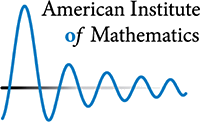
Math careers in academia

What is like to live the life of a math professor?
There are many answers to this question, and they very much depend upon the nature of the mathematician’s institution. A professor at a private research university will have a different set of responsibilities and priorities to one at a liberal arts college, and different again, to someone at a large, state university. Differences also emerge for academic institutions outside the U.S.
If you’re a math PhD student or a post-doc, how do you even begin to learn about this spectrum of possible careers (and lifestyles) in academia? In June 2017, MSRI and AIM combined efforts to introduce a group of young mathematicians to the various options by hosting the “Careers in Academia” workshop.
The 3-day workshop brought together academics representing a breadth of institution types with recent math PhDs. Combining panel discussions and plenary sessions with individual consultations, the workshop’s objective was to convey the distinct cultures associated with various institutions, all under the larger, academic umbrella. Mentors were selected for their long-standing experience in the hiring processes. The ultimate goal was to have each participant leave with a better appreciation for their choices ahead, as well as a deeper understanding of the application process.
Sessions focused around the elements of the application process: cover letter, C.V., the research and teaching statements, etc., the steps beyond: campus interview, the job talk, negotiations, and finally, the first few years: maintaining an active research program, balancing research, teaching, and service, and understanding the expectations for the tenure process.
An important outcome of the workshop is a new resource that can benefit every mathematics PhD student and postdoc, particularly those who are considering an academic career. Many of the workshop activities were recorded, and a series of 7 videos is now available. The videos cover the key components of the job application, including the research statement, teaching statement, job talk, and elevator speech. Material is available on the AIM website .